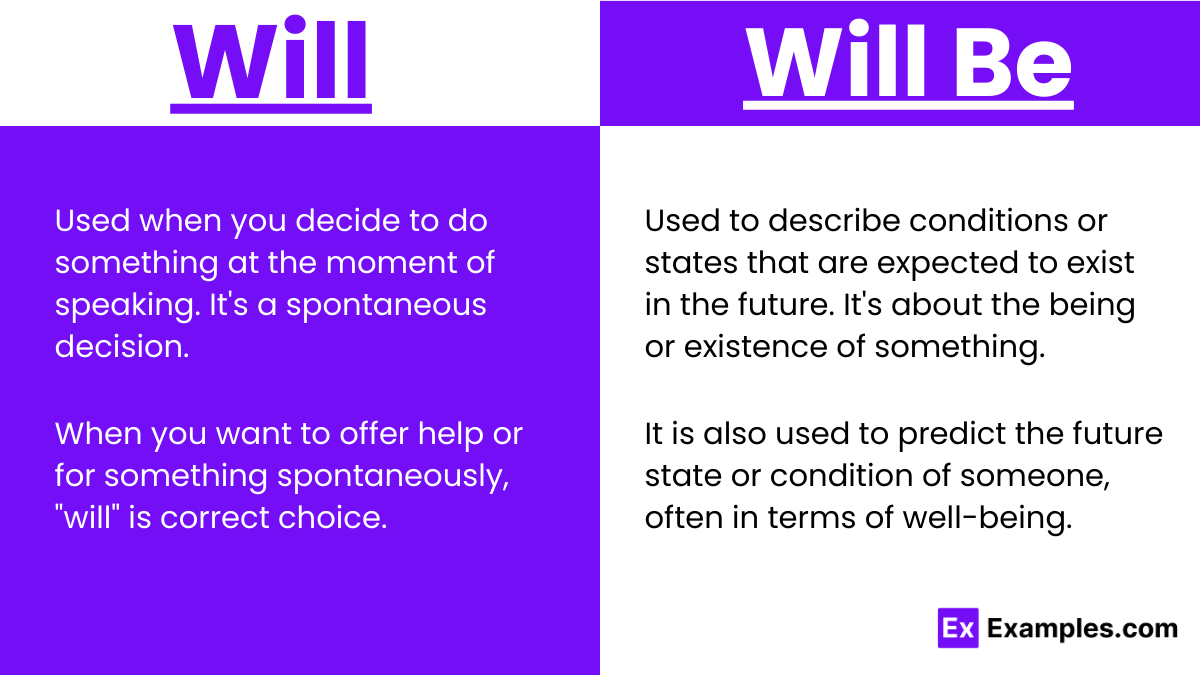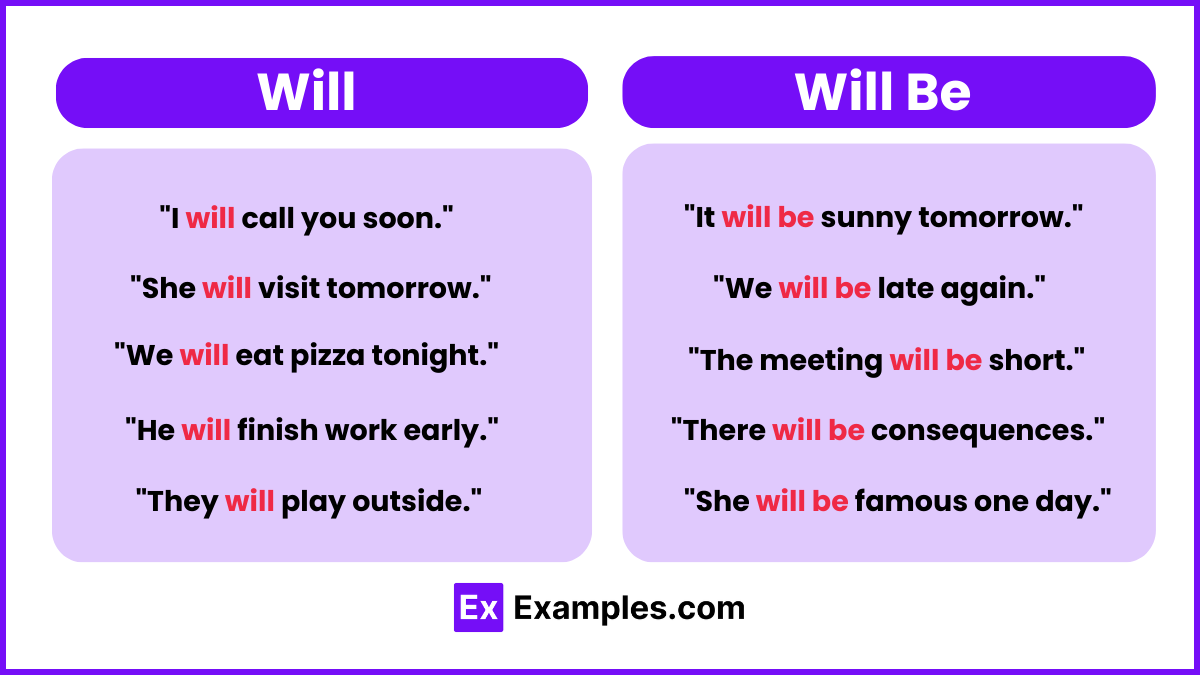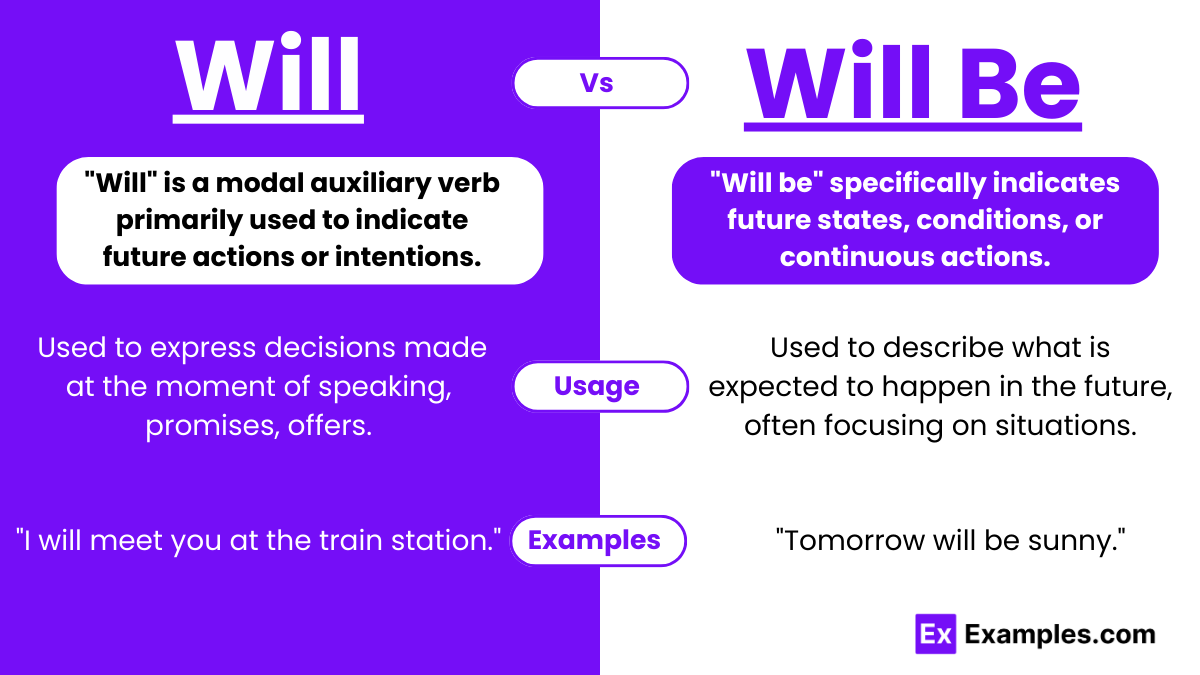Will vs Will Be – Difference, Meanings, Examples, Usage
Diving into the future tenses, “will” and “will be” might seem tricky at first glance. In a nutshell, ‘will‘ often signals a decision or promise about the future, while ‘will be‘ steps into the scene when we talk about ongoing future actions. Let’s untangle these threads together, making it simpler to understand and use these expressions in your daily conversations and writings.
Will and Will Be – Meanings
“Will” and “Will Be” are both forms used in English to talk about the future. However, their use can indicate different degrees of certainty or the nature of future events.
- Will: “Will” is a modal auxiliary verb primarily used to indicate future actions or intentions. In grammar, it helps to form the future tense by modifying the main verb that follows it, without being conjugated for subject or tense. “Will” is used to express decisions made at the moment of speaking, promises, offers, and predictions that are not based on current evidence.
- Will Be: “Will be” combines the modal auxiliary “will” with the base form of the verb “to be” (be), functioning as part of the future tense structure. It specifically indicates future states, conditions, or continuous actions. “Will be” is used to describe what is expected to happen in the future, often focusing on situations or states rather than specific actions.
Summary
Both “will” and “will be” are used to talk about the future. The main difference lies in their application: “will” often reflects a decision or a prediction made at the moment of speaking, while “will be” describes a future state or condition that is more certain or planned. For example, “I will call you later” (a decision made now) vs. “The meeting will be held tomorrow” (a planned future event).
How to Pronounce Will and Will Be
- Will: Pronounced as /wɪl/ (wil).
- Will Be: Pronounced as /wɪl biː/ (wil bee).
Differences between Will and Will Be
| Aspect | Will | Will Be |
|---|---|---|
| Usage | Used for decisions, promises, or predictions made at the moment of speaking. | Used to describe future states or conditions that are expected to happen. |
| Function | Serves as a modal auxiliary verb. | Functions as the future tense form of “to be”. |
| Context | Often reflects spontaneity or uncertainty. | Indicates a more definite or planned future event or state. |
| Examples | “I will help you with that.” | “The event will be held next week.” |
How to Remember the Difference between Will and Will Be
To differentiate between “will” and “will be,” consider “will” as the verb you use for actions and decisions made in the spur of the moment, while “will be” is for describing future states that are more certain or planned. Think of “will” as the promise of action, and “will be” as painting a picture of the future.
When to Use Will and Will be

Usage of Will
- Instant Decisions: “Will” is used when you decide to do something at the moment of speaking. It’s a spontaneous decision without prior planning.
- Promises: This modal verb is also employed to assure someone that you are committed to doing something in the future.
- Offers: When you want to offer help or volunteer for something spontaneously, “will” is the appropriate choice.
- Predictions: It’s used for making predictions about the future, especially when you have a strong belief that something will happen.
Usage of Will Be
- Future States: “Will be” is used to describe conditions or states that are expected to exist in the future. It’s about the being or existence of something or someone at a later time.
- Future Continuous Tense: When you want to talk about an action that will be happening at a specific moment in the future, “will be” followed by a verb in its -ing form is the correct structure. It emphasizes the ongoing nature of the future action.
- Passive Voice: In the construction of the future passive voice, “will be” indicates that an action will be performed by someone or something in the future, often when the doer is not known or not important.
- Predictions about Someone’s State: It is also used to predict the future state or condition of someone, often in terms of well-being, feelings, or situations they will be in.
Will and Will Be – Examples

Examples of Will
- I will meet you at the train station.
- We will see what happens.
- Moreover, we will see significant improvements in technology in the next decade.
- Consequently, there will be a noticeable shift in consumer behavior.
- Additionally, we will explore new markets to expand our reach.
Examples of Will Be
- Tomorrow will be sunny.
- As a result, there will be more job opportunities in the green tech sector.
- Similarly, there will be advancements in medical technology that will benefit everyone.
- On the other hand, there will be concerns regarding data privacy.
- In contrast, there will be areas that will face economic downturns.
Synonyms
| Will | Will Be |
|---|---|
| Shall | Is going to be |
| Is to | Is scheduled to be |
| Is expected to | Is likely to be |
Exercise
- I ____ visit my grandparents this weekend.
- The exhibition ____ open to the public next month.
- We ____ decide after the meeting.
- The play ____ start at 7 PM sharp.
- She ____ be the team leader for this project.
Answers
- will
- will be
- will
- will
- will be
FAQ’S
Which Sentence Use “Will Be”?
“Will be” indicates future actions or states, as in “I will be there soon.”
What is the Difference Between “Will” and “Going to Be”?
“Will” implies a future intention, while “going to be” suggests a planned future action.
What is the Difference Between “Will Be” and “Become”?
“Will be” refers to a future state, “become” implies a transformation.
Is There Any Difference Between “Would Be” and “Will Be”?
“Yes, “would be” is conditional, “will be” indicates certainty.
Which is Correct: “I Want to Be” or “I Want to Become”?
Both are correct; “want to be” is a state, “want to become” implies change.


